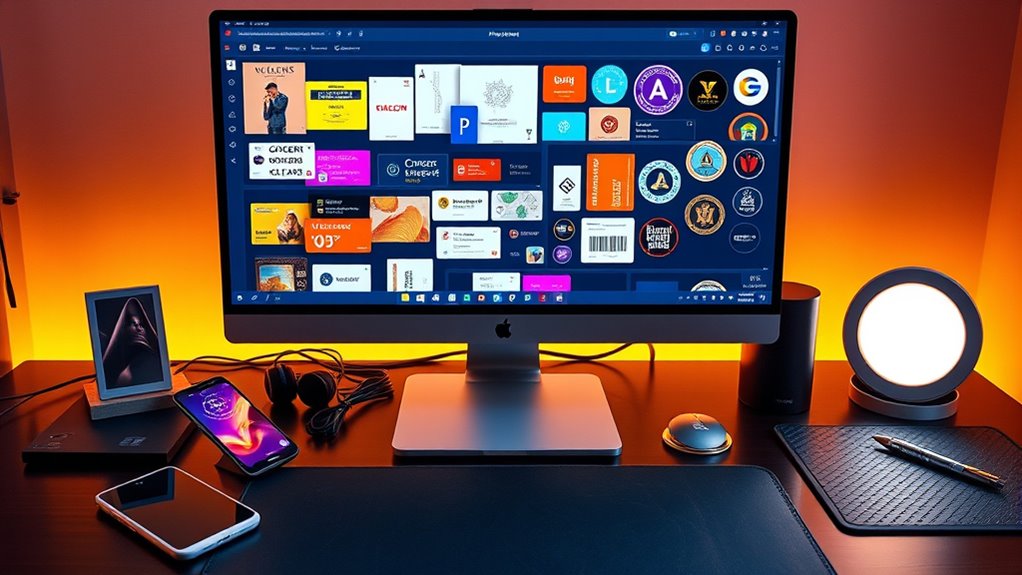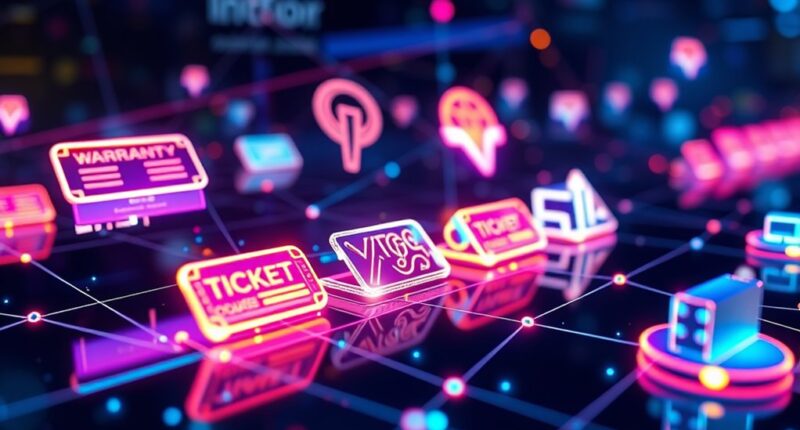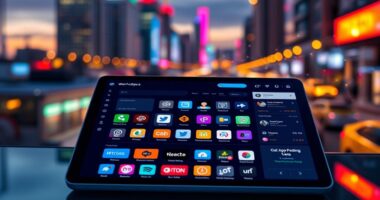NFTs are expanding beyond digital art to include tickets, warranties, and online courses. They give you secure, verifiable proof of ownership, authenticity, and achievement across various assets. With blockchain technology, you can easily transfer or validate tickets, claim warranties, and store certifications securely. This shift makes transactions more transparent and efficient, empowering you with greater control. Keep exploring to discover how NFTs are transforming multiple industries and reshaping your digital experiences.
Key Takeaways
- NFTs serve as digital tickets for events, reducing fraud and enabling easy resale.
- They securely store warranties and proof of purchase, simplifying claims and preventing counterfeits.
- NFTs verify online course completions and certifications, making credentials tamper-proof and portable.
- Beyond art, NFTs authenticate ownership of various assets, enhancing security and transparency across industries.
- This technological shift benefits creators, consumers, and organizations by streamlining verification and transfer processes.

Although NFTs initially gained fame as digital art collectibles, their potential now extends far beyond that sphere. You can see this clearly with how they’re transforming industries by serving as proof of authenticity and ownership for a variety of digital and physical assets. For example, in the domain of digital collectibles, NFTs function as unique tokens that verify ownership of items like trading cards, music, or videos. When you purchase an NFT tied to a digital collectible, you’re not just buying a file; you’re acquiring a verifiable piece of intellectual property. This means you can confidently prove you own the original, which helps prevent counterfeit or unauthorized copies from flooding the market. The ability to register and transfer digital collectibles securely on a blockchain enhances trust and transparency, making NFTs a game-changer for creators and collectors alike.
NFTs are transforming industries by certifying ownership and authenticity for digital and physical assets beyond art.
But NFTs aren’t limited to art or collectibles—they’re also revolutionizing how tickets and event access are managed. Imagine purchasing a concert or sports event ticket as an NFT. Instead of printing paper tickets or relying on centralized systems, you hold a digital token that serves as your entry pass. This method reduces fraud, streamlines entry processes, and enables seamless transfer or resale without losing the ticket’s authenticity. You can transfer or sell your ticket easily, knowing the blockchain guarantees its legitimacy. Similarly, event organizers can directly verify ticket ownership, cutting down on counterfeit tickets and scalping. This shift not only improves security but also empowers you with more control over your event experiences.
NFTs are also changing the way warranties and product authenticity are handled. When you buy a high-value item or electronic device, having an NFT-based warranty means your proof of purchase and warranty rights are stored securely on the blockchain. This can simplify claims, prevent fraud, and ensure your warranty remains intact even if you lose the physical receipt. Manufacturers can also use NFTs to authenticate genuine products, helping you avoid counterfeit goods. By linking warranties and product authenticity to NFTs, companies create a transparent, tamper-proof record that benefits both consumers and brands. Additionally, leveraging AI-enhanced processing power in these systems can further improve verification efficiency and security.
Moreover, online courses and educational credentials are now leveraging NFTs to verify achievements. When you complete a course, you might receive an NFT certificate that’s stored on the blockchain. This digital badge can’t be forged or altered, providing a reliable proof of your skills or qualifications. Educational institutions benefit by issuing verifiable credentials that employers can easily validate. For you, this means your achievements are securely stored, portable, and recognized globally, making NFTs a valuable tool for lifelong learning and professional development.
Frequently Asked Questions
How Do NFT Tickets Prevent Counterfeiting?
NFT tickets prevent counterfeiting by proving digital ownership and authenticity verification. When you buy an NFT ticket, you get a unique, tamper-proof digital record stored on the blockchain. This makes it nearly impossible for someone to forge or duplicate your ticket. You can easily verify its authenticity online, ensuring that your entry remains secure and genuine, reducing the risk of counterfeit tickets.
Can NFTS Verify Product Warranties Securely?
Yes, NFTs can verify product warranties securely by leveraging digital signatures embedded in each NFT, which guarantees authenticity and prevents tampering. When you register a warranty as an NFT, it becomes part of the supply chain’s transparent record, making verifying its validity straightforward. This secure system reduces fraud, giving you confidence that the warranty is legitimate and up-to-date, all while maintaining a tamper-proof digital trail.
Are Online Courses Using NFTS Accessible Worldwide?
Imagine a vast digital highway connecting eager learners everywhere—yes, online courses using NFTs are accessible worldwide. You can access these courses regardless of your location, thanks to blockchain’s digital accessibility. This technology breaks down borders, offering a global reach that guarantees education isn’t confined by geography. So, whether you’re in a bustling city or a remote village, NFTs make it possible for you to learn without limits.
What Are the Environmental Impacts of NFTS in Non-Art Sectors?
You should know that NFTs in non-art sectors raise environmental concerns mainly due to high energy consumption. The process of minting and transferring NFTs often relies on energy-intensive blockchain networks, which contribute to carbon emissions. If you’re concerned about sustainability, it’s important to contemplate the environmental impacts of these digital assets, especially as their use expands into tickets, warranties, and online courses.
How Do Nft-Based Warranties Improve Consumer Trust?
NFT-based warranties boost your trust by providing secure proof of authenticity through digital signatures and blockchain validation. When you claim a warranty, the blockchain verifies the record instantly, ensuring the warranty is legitimate and unaltered. This transparency reduces fraud and disputes, giving you confidence that your warranty is valid. You can rely on these digital records to protect your rights, knowing they’re backed by immutable blockchain technology.
Conclusion
Now that NFTs are branching into tickets, warranties, and online courses, you can see how versatile they’ve become. Did you know that over 50% of NFT sales in 2023 are for purposes beyond art? This shift means you can use NFTs for more secure event access, proof of warranty, or even educational credentials. It’s exciting to imagine how these digital assets will continue to transform everyday transactions and experiences in the near future.









